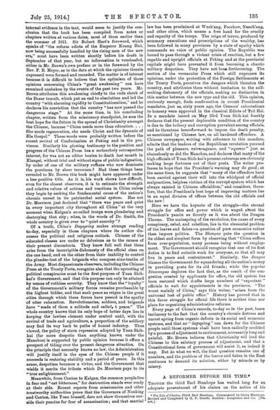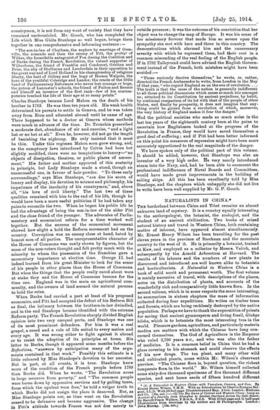A REFORMER BEFORE HIS TIME.* THOUGH the third Earl Stanhope
has waited long for an adequate presentment of his claims on the notice of his • The Life of Charles, Third Earl Stanhope. Commenced by Ghita Stanhope. Revised and Completed by G. P. Gooch. London: Loagmans and Co. [10s. net.].
countrymen, it is not from any want of variety that they have remained unchronicled. Mr. Gooch, who has completed the Life which Miss Ghita Stanhope so well began, brings them together in one comprehensive and informing sentence :—
"The son-in-law of Chatham, the nephew by marriage of Gren- ville, the comrade and then the enemy of Pitt, the prote0 of Wilkes, the formidable antagonist of Fox during the Coalition and of Burke during the French Revolution, the valued supporter of Wilberforce, the friend of Franklin and Condorcet, Grattan and Price, the ally of Shelburne and Lauderdale in their opposition to the great war and of Lord Holland in his championship of religious liberty, the butt of Gillray and the bogy of Horace Walpole, the hero of the youthful Coleridge and Landor, the oracle of the little band of Parliamentary Reformers who never lost courage or hope, the patron of Lancaster's schools, the friend of Fulton and Rennie and himself an inventor of the first rank—few of his contem- poraries touched the life of their age at so many points."
Charles Stanhope became Lord Mahon on the death of his brother in 1763. He was then ten years old. His weak health determined his parents to settle in Geneva, and he was taken away from Eton and educated abroad until be came of age. There happened to be a doctor at Geneva whose methods were much in advance of the time. Dr. Tronchin prescribed a moderate diet, abundance of air and exercise, "and a light hat or no hat at all." Even he, however, did not go the length of banishing the nightcap. He only insisted that it must be thin. Under this regimen Mahon soon grew strong, and, as the sumptuary laws introduced by Calvin had been but slightly modified, there were no temptations to luxury—"no objects of dissipation, theatres, or public places of amuse- ment." His father and mother approved of this austerity in principle, but Lady Stanhope made a stand, though an unsuccessful one, in favour of hainpowder. "To these early surroundings," says Miss Stanhope, "are due his scorn of luxury and display, his devotion to science and philosophy, his impatience of the insularity of his countrymen," and, above all, "his love of civil liberty." The last two of these
qualities remained with him to the end of his life, though he would have been a more useful politician if he had taken any pains to reconcile the two. When he began his public life he had the advantage of being the son-in-law of the elder Pitt and the close friend of the younger. The advocates of Parlia- mentary and economical reform for a time worked well together. But the success of the economical movement showed how slight a hold the Reform movement had on the country. Corruption was an enemy close at hand, hated by honest men of all parties. The unrepresentative character of the House of Commons was easily shown by figures, but the mass of the non-voters thought and felt pretty much with the minority to whom the possession of the franchise gave a momentary importance at election time. George IL had indeed learned from his great Minister to look for the sense of his people in other places than the House of Commons. But when the things that the people really cared about were at stake they and the House of Commons became for the time one. England was in the main an agricultural com- munity, and the owners of land seemed the natural persons to hold the reins.
When Burke had carried a part at least of his proposed
economics, and Pitt had accepted the defeat of his Reform Bill as final, the intimacy between the brothers-in-law dwindled, and in the end Stanhope became identified with the extreme Reform party. The French Revolution sharply divided English opinion into two very unequal parts, and Stanhope was one of its most prominent defenders. For him it was a real gospel, a creed and a rule of life suited to every nation and every age. It was wrong either to fight against it abroad or to resist the adoption of its principles at home. His letter to Burke, though it appeared some months before the Reflections, "answers by anticipation many of the argu- ments contained in that work." Possibly this estimate is a little coloured by Miss Stanhope's devotion to her ancestor. But in part, at all events, it is true. Stanhope knew more of the condition of the French people before 1789 than Burke did. When he wrote, "The Revolution arose in large measure from poverty," and "'The common people were borne down by oppressive services and by galling taxes, from which the opulent were free," he told a vulgar truth to
which Burke did not assign the place it deserved. But, as Miss Stanhope points out, as time went on the Revolution ceased to be defensive and became aggressive. The change in Pitt's attitude towards France was not due merely to outside pressure ; it was the outcome of his conviction that her object was to change the map of Europe. It was his sense of her missionary fervour that made him so severe upon the sympathy she met with here and there in this country. The demonstrations which alarmed him and the unnecessary severity with which he repressed them, had their root in a common misreading of the real feeling of the English people. If in 1792 Talleyrand could have advised the English Govern- ment instead of the French, both mistakes might have been avoided :—
"Those curiously deceive themselves," he wrote, or, rather, directed the French Ambassador to write, from London in the May of that year," who regard England as on the eve of revolution.... The truth is that the mass of the nation is generally indifferent to all those political discussions which cause so much stir amongst us; attached to its Constitution by ancient prejudices, by habit, by continual comparison of its lot with that of the people of other States, and finally by prosperity, it does not imagine that any- thing could be gained from a revolution of which, moreover, the very history of England makes it fear the danger."
Had the political societies who made so much noise in the last ten years of the eighteenth century been at the pains to ascertain how Englishmen looked at the progress of the Revolution in France, they would have saved themselves a
good deal of suffering ; and if Pitt had been better informed on this point his measures of repression might have been more
accurately apportioned to the real magnitude of the danger.
We have spoken only of the political part of this volume. It should be added, however, that Stanhope was also an inventor of a very high order. He very nearly introduced steam into the Navy, and, had he been able to surmount the
professional indifference of Naval Boards and Committees, would have made great improvements in the building of sailing ships. All this has been excellently told by Miss Stanhope, and the chapters which unhappily she did not live to write have been well supplied by Mr. G. P. Gooch.







































 Previous page
Previous page